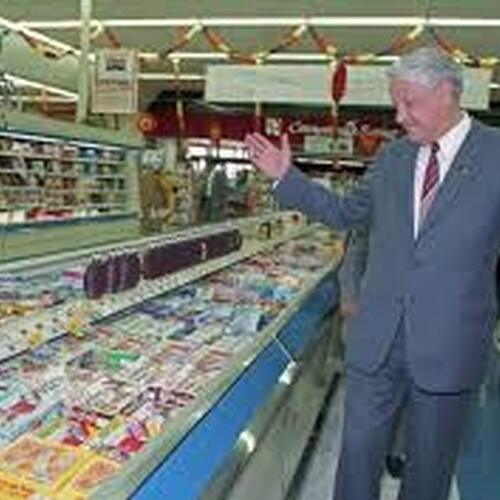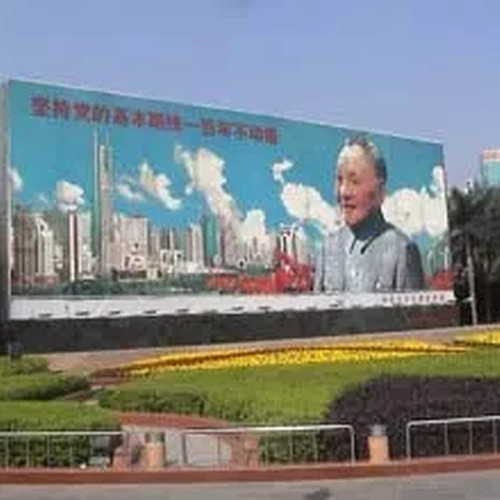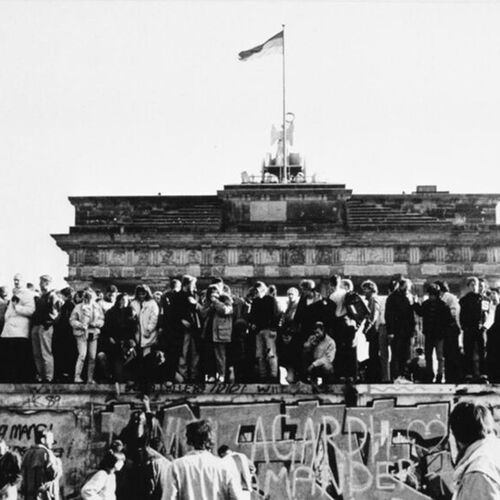A Shifting Economic Paradigm (Latter Half of 1970s to Early 1990s)
Perestroika
The USSR undertook major economic and political reforms with the accession of Mikhail Gorbachev to power. The economic reforms or perestroika will be the focus of this portion of the exhibit. Following a period of economic stagnation relative to the west, soviet leadership, chief among them the new General Secretary of the communist party Mikhail Gorbachev, felt that the central planning model of the USSR needed to change for the Soviet economy to exit its stagnation and become competitive with the West. The reforms undertaken by the USSR under Gorbachev to decentralize and reform the economy became known as Perestroika. These reforms failed to achieve what was intended and save the Soviet economy from collapse. The resulting collapse ended the Communist movement as an economic movement. It led to the embrace of capitalism among the former member countries of the USSR, which are now independent and largely self-governing. These reforms and their results undoubtedly changed the global economic paradigm and the global economic order.
Socialism With Chinese Characteristics
The People's Republic of China embarked on a transformative path of economic reform under the leadership of Deng Xiaoping, who rose to prominence in the late 1970s as chairman of the Chinese Communist Party. These reforms marked a decisive shift from the centrally planned economy of the Mao era to a model that incorporated market-oriented principles while maintaining political control under the Communist Party. Facing widespread poverty and inefficiencies in its state-run economy, Chinese leadership sought to modernize the economy by introducing reforms such as the establishment of Special Economic Zones (SEZs), the de-collectivization of agriculture, and opening the country to foreign investment and trade. These reforms succeeded in unleashing unprecedented economic growth, lifting hundreds of millions of people out of poverty, and positioning China as a major player in the global economy. Unlike the Soviet Union's reforms, China's approach managed to preserve political stability while fundamentally transforming its economic landscape, setting the stage for its rise as a global economic powerhouse and reshaping the global economic order with China towards the top of the new order still dominated by the United States.
Shock Therapy, Other Changes, and a Continental Economic Union
The Eastern Bloc in Europe underwent sweeping economic transformations as countries transitioned from centrally planned economies to market-oriented systems. The fall of communist regimes in the late 1980s, coupled with the collapse of the USSR, opened the door for these nations to embrace capitalism and integrate into the global economy. Germany's economic unification was a pivotal moment in this process, as the prosperous West German economy absorbed the struggling East German system, requiring significant investment and structural reforms to bridge the economic divide. Meanwhile, many Eastern European countries, including Poland and Hungary, adopted shock therapy—a rapid implementation of market reforms characterized by privatization, price liberalization, and the removal of subsidies. While this approach was initially painful, with rising unemployment and inflation, it laid the foundation for long-term economic growth and integration into European markets. Simultaneously, the broader European continent moved toward greater economic unity. The establishment of the European Union (EU) and the Maastricht Treaty set the stage for a continental economic union, promoting trade liberalization, common standards, and the eventual adoption of a single currency, the euro. These changes not only helped stabilize Eastern Europe but also reshaped the global economic landscape by fostering a more interconnected and competitive Europe, solidifying its role as a major economic bloc in the post-Cold War world.
Media From the Time
Geneva Summit
Collection of news reports: one of the subjects of the news report was the ongoing Geneva summit between President Reagan and General Secretary Gorbachev. The Geneva Summit was one of many summits between President Reagan and General Secretary Gorbachev. However, this summit was instrumental in establishing a relationship between the two men and their countries and made it easier to continue discussions between the two men and their countries.
A Firing Line Debate: Resolved: That the Cold War Is Not Coming to an End
This interview was conducted on Firing Line with William F. Buckley, a notable and historically important conservative journalist. This interview demonstrates many of the views of the time about how the Cold War would end and if it was even ending. With hindsight, we know that it did end, and the USSR collapsed. One notable guest during this episode is Newt Gingrich, former but at that time future Republican Speaker of the United States House of Representatives. Some of the views expressed in this interview aged better than others.
Mikhail Gorbachev on End of Cold War
Mikhael Gorbachev delivers a speech to Westminster College in Fulton, Missouri, and discusses the collapse of the USSR. This is the same place where Winston Churchill declared that an “Iron Curtain” had descended on Eastern Europe.


